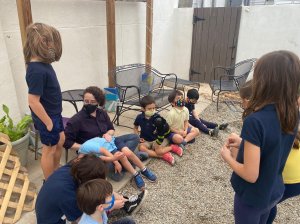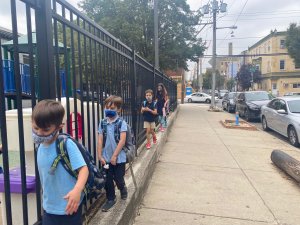
With fall in the air and the High Holidays behind us, we were excited to experience this joyful five-day week with students! We explored Jewish wisdom around boundary setting, independence, communication, and the importance of treating others with kindness.
I was blown away by how much these kiddos already know about themselves and their needs. During shulchanot avodah students had the option to engage with movement.
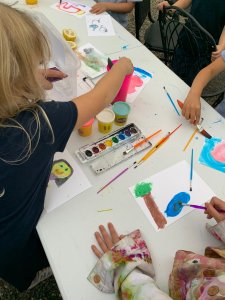
I watched one student as she decided to express herself through both movement and storytelling in our If not now when dancing activity. She worked through one particular goal she has set for herself, controlling her anger. After writing out a story that represented her goal, she choreographed movements to tell the story visually.
The dance was called If not now, when… will I control my anger?
She recounted her story:
I am being calm and reading a book.Then my brother interrupts me, and I get angry. I push the energy of the anger into my hand and do something helpful with it, like turn the page. If he does not stop, I take a deep breath and tell him “please stop.” If he still does not listen I tell an adult. The colors of the scarves represent the stages of the story.
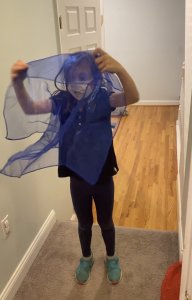
She performed her dance in the hallway with scarves that represented various stages of her emotional journey. Green meaning “I am okay,” blue meaning “one more chance,” and red meaning “it’s time to get an adult.”
Throughout the week students reflected on things they can do for themselves and the ways we are able to take care of ourselves. In response to a bit of text from Pirkei Avot: We discussed ideas of how we take care of ourselves and made bracelets with one word reminders.
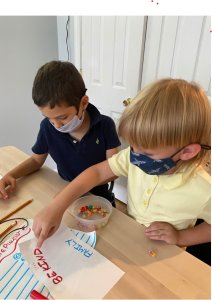
Students said they can practice self-care by:
- Being kind.
- Taking a break.
- Eating yummy things.
- Petting a dog.
- Being healthy.
- Being with family.
- Sleeping.
- Gardening.
- Drawing.
- Giving a self hug.
- Pushing and pulling on things.
We also reflected on music being an important part of a welcoming environment and a tool that can help us take care of ourselves. Together we began creating a collective playlist. If you would like to add to it with your children, it is called Makom Community SP on Spotify!
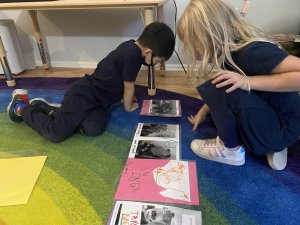
While working on a self-care bracelet one student became inspired to write a short poem about time which he explained is an important component of taking care of himself:
“Time helps me grow. I have grown from YESTERDAY!”
When digging deeper into the wisdom from Pirkei Avot, students had a rich discussion about self-care and how it affects the way we show up in our various communities.
“If I am not for myself, who is for me?” 1:14 (14)
- “I understand the words, but I don’t understand the why.”
- “This is about not sticking up for you or being you, not doing what you usually do.”
- “This is saying you are pushing yourself down.”
- “My job in life is to be kind to myself, that’s what I am supposed to be doing.”
- “Being kind to yourself IS being kind to others.”
- “If you are mean to yourself you can’t be yourself and other people will be sad.”
- “Being kind to yourself changes your behavior.”
- “Being mean to yourself can hurt other people.”
- “If you are in a bad mood, people who love you will be sad.”
- “I am not for myself means you can’t take care of yourself.”
- “If someone else takes care of you, you can take care of them.”
- “Bully’s had something happen to them and they just want to get it out.”
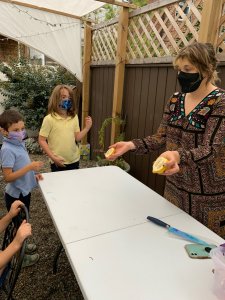
Next week we are looking forward to learning about Indigenous Peoples Day atSchool’s Out Camp . Starting on Tuesday, we will dive into the similarities and differences we share with our neighbors and how this affects our responsibilities.
